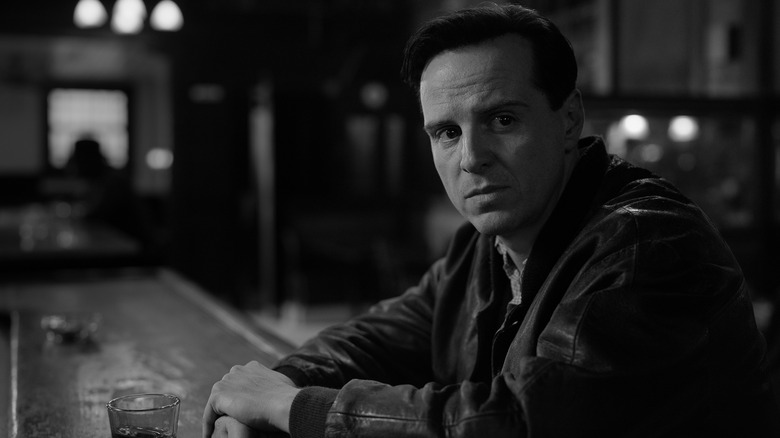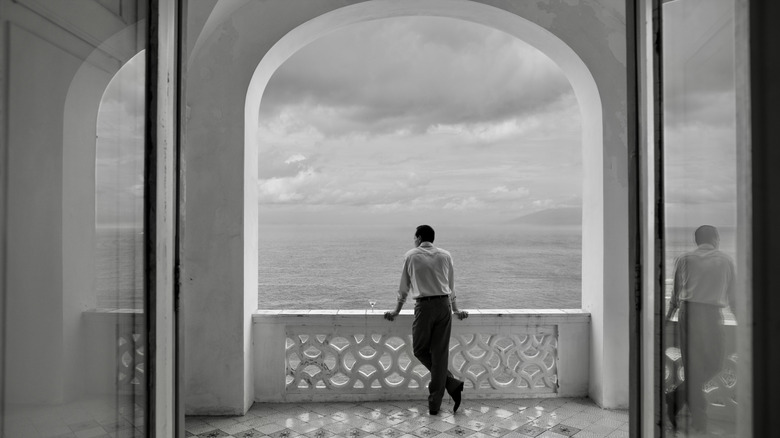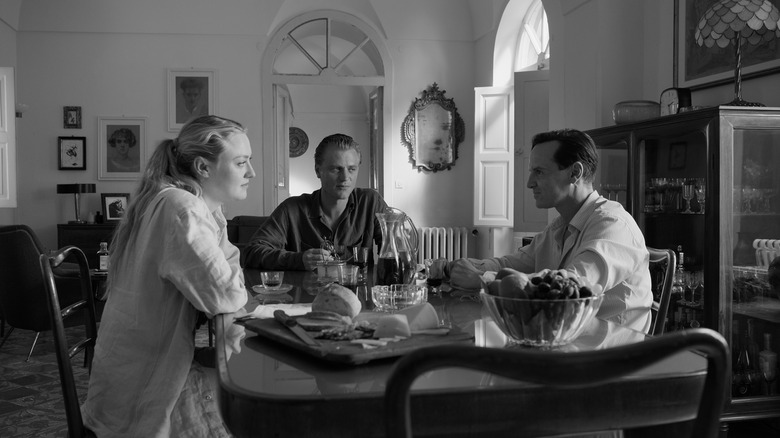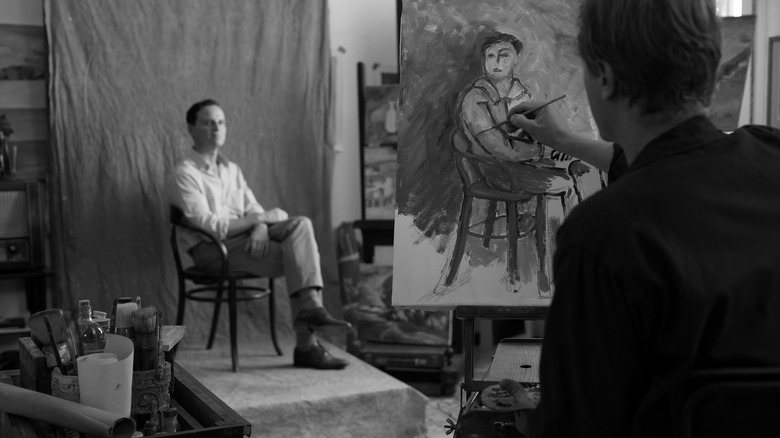Ripley Review: Andrew Scott Cons Everyone In This Chilling, Stylish Series
This review may contain mild spoilers.
Who is Tom Ripley? It's a question that hangs over "Ripley," Steven Zaillian's chilly, chilling, uber-stylish adaptation of Patricia Highsmith's "The Talented Mr. Ripley." This material has been tackled on screen before — once as the 1960 French film "Purple Noon," and even more prominently in 1999 via Anthony Minghella's "The Talented Mr. Ripley." Zaillian, who wrote and directed the entire new Netflix series, seems to go to great lengths to distance his adaptation from Minghella's, even if they're essentially the same story. While the 1999 film was awash in bright, sunny colors, Zaillian and cinematographer Robert Elswit employ noir-tinged black-and-white cinematography that often looks straight out of a silent German expressionist film.
Minghella's film also leaned into the homoeroticism at the center of the Ripley character, but the Tom Ripley here, played in a brilliant calculating manner by Andrew Scott, feels almost sexless. One character even comments at one point that Ripley is too "weird" to have any sort of sexuality. At times, the Tom Ripley at the center of "Ripley" feels less than human; he's like an alien from a distance planet suddenly inhabiting a human meat suit. He can pretend to be human quite well, but deep down inside, we sense something is lacking. He's a void; an abyss daring people to stare into him.
This Ripley is also older than previous versions. Matt Damon was about 29 when he played the character and looked even younger, and in Highsmith's novel, Ripley says he's 25. Scott is 47, and his age gives his Ripley a certain edginess — he's been around longer; doing his thing on a longer timeline. He's more experienced. More skilled. More hardened by his situation. And perhaps that makes him even more dangerous. Who is Tom Ripley? He's whoever the current situation needs him to be.
An opportunity
When we first meet Tom Ripley, he's conning his way through a depressing, solitary life in 1960s New York City. His apartment is a squalid one-room rat-trap and he seems on the verge of total financial ruin at any moment. Then an opportunity comes knocking: a wealthy man named Herbert Greenleaf ("Manchester by the Sea" filmmaker Kenneth Lonergan) wants to hire Ripley to jet off to the Italian coast to find his son, Dickie Greenleaf (Johnny Flynn). Dickie is living it up in the fun and sun off his father's dime, and dear old dad would like the young man to finally come back home to the states. Herbert has learned through the grapevine that Ripley is friends with his son, and while Ripley says that's true, we get the sense that he doesn't really know Dickie at all. That he's playing pretend. Pretending is what Tom Ripley does best; he's skilled at telling people what they want when they want to hear it. Does he have a personality of his own? Or is he merely a collection of nervous energy waiting to absorb the identity of whomever he crosses paths with?
After convincing Herbert he's indeed the man for the job, Ripley flies off to Italy with all expenses paid and eventually tracks down Dickie, who is living in luxury with Marge (Dakota Fanning), an author who clearly loves Dickie even if he clearly doesn't love her. For her part, Marge doesn't like Ripley from the jump — it's as if she can instantly see through his facade and sense that something is wrong.
As for Ripley, he takes one look at Dickie and his beautiful, sun-dappled life, and changes forever. Here is an opportunity for a new life. It's not that this is the life Ripley always wanted; it's just that this is a life better than what he currently has going on, and that's good enough for Tom Ripley. Scott plays the character in a manner that makes you think he's only just one step ahead of everyone else, no more, no less. It's not that Ripley is a master con artist who can see twenty moves ahead of his prey; it's just that everyone around him is so easily duped. People are suckers, and Tom Ripley knows just how to exploit that.
What a messy thing it is to kill a man
If you've read the book or seen the other adaptations, you know where this story is headed, but I won't give away too many details in case you're going in cold. Just know that Ripley's scheming eventually leads to multiple murders, and Zaillian has great fun showcasing not so much the murders themselves but the aftermath and how Ripley goes about covering his tracks. Alfred Hitchcock once said, "In films, murders are always very clean. I show how difficult it is and what a messy thing it is to kill a man." It seems like Zaillian has taken this quote to heart, giving us long, meticulous stretches where Ripley undergoes a series of tasks all in the name of getting away with murder. The results are often darkly comedic, such as when Zaillian keeps cutting to a lazy cat who seems to be watching over Ripley as he trudges up and down a flight of stairs following a murder.
Unfortunately, after Ripley has committed his shocking crimes, "Ripley" starts to run out of juice. It introduces us to a whole new character, a police inspector played by Maurizio Lombardi. Lombardi's performance is quite good — he hits just the right droll notes for the part — but by the time he arrives on the scene, we're so wrapped up in Ripley as a character that anytime the story cuts away from him the show's electric energy diminishes.
We want more Ripley, not less.
The secret weapon
There's a coldness to "Ripley," in sharp contrast to its sunny locales. Part of this is due to the inhuman-like nature of its lead character — Tom is an enigma, and we can never really get close to him. Still, Scott's performance and Zaillian's direction both find ways to make us somehow care about Ripley, even when he's committing horrible acts. We get so wrapped up in the process that the thought of him getting caught sets us on edge; despite our better natures, we want him to get away with it all.
As good as Scott and the other actors are, Elswit's gorgeous, haunting cinematography is the secret weapon; the real draw. The camera is often held at a distance, giving us wide-open shots of rooms with lofty ceilings, creating a great sense of infinite space. Then, in the blink of an eye, the footage will focus on a close-up of a hand; a window; an ashtray; a glass of wine; a painting. The shadowy works of Caravaggio become a touchstone — Ripley becomes enamored with him, and Elswit's cinematography seems to mimic that blending of light and darkness at times.
From a purely visual standpoint, "Ripley" is one of the best original shows Netflix has to offer. Story-wise, it feels slightly lopsided — as if there's not quite enough here to sustain eight episodes. And yet, should Zaillian and Netflix continue onward and adapt Highsmith's other Ripley novels into new seasons, I'd gladly return to this world. I want to see what Tom Ripley gets up to next.
/Film Rating: 7 out of 10



